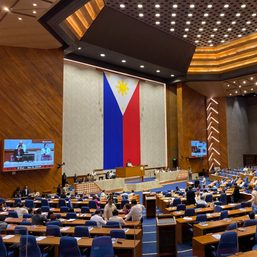SUMMARY
This is AI generated summarization, which may have errors. For context, always refer to the full article.
After investigating why so many children in the Philippines are being sexually exploited online, especially during pandemic lockdown, a House committee found the need to strengthen the role of technology and education campaigns in preventing the abuse.
The House committee on the welfare of children approved on Wednesday, March 17, a report pushing for strengthened laws that would fight online sexual exploitation of children (OSEC).
The House committee, chaired by Tingog Sinirangan Representative Yedda Marie Romualdez, found multiple gaps in the current laws that fail to protect children from the crime.
Children’s rights groups flagged the increase of OSEC during the coronavirus lockdown, now imposed for a year in many parts of the Philippines.
Reports of OSEC tripled as early as May 2020, the Department of Justice (DOJ) reported, when hard lockdowns were imposed.
The DOJ’s cybercrime office received 870,500 more cyber tips during the 2020 lockdown compared to figures from the same period in 2019.
What’s missing in current laws?
Following years of the Philippines being known as a global epicenter of the OSEC trade, lawmakers had filed at least four House resolutions urging the committee to investigate the “alarming situation” of OSEC especially brought about by the COVID-19 pandemic.
Despite the state’s policy of protecting children from all forms of sexual abuse, conviction rates in the country remained low. Out of thousands of reports in 2018, there were only 27 convictions of OSEC perpetrators, according to the US State Department’s Trafficking in Persons 2019 report.
The House committee report recommended revisions to the laws on preventing child sexual exploitation materials (CSEM), human trafficking, cybercrime, and photo and video voyeurism.
Advocates and lawmakers have long flagged the silence of the anti-child pornography law – signed in 2009 – on the detection of livestreamed abuse, and the role of social media.
This law compels internet service providers to inform law enforcers upon obtaining knowledge of CSEM on their servers. The Department of Information and Communications Technology (DICT) claimed there was “no way to automatically have it be detected” if the CSEM was not earlier flagged.
The responsibility could be better carried out by content hosts, like social media sites, the DICT told the House of Representatives.
The lawmakers also want to exempt human trafficking from the anti-wire-tapping law to “empower law enforcement agents to conduct surveillance, interception, and recording of communications.”
Meanwhile, the House adopted recommendations from the Philippine National Police to continuously train investigators handling OSEC cases, and to strengthen partnerships with foreign law enforcement, like the United States Homeland Security.
Increasing ways to send online payments during the pandemic have also made it easier for criminals to make OSEC-related transactions. The House committee recommended drafting and filing bills that would amend banking laws, including the anti-money laundering law, to implement stricter procedures in order to trace OSEC transactions.
Community-based approach
One reason why OSEC is so prevalent in the Philippines is because the crime happens in private – and family members are often perpetrators. The House committee found that there is a lack of awareness on OSEC.
During Wednesday’s hearing, the Commission on Human Rights (CHR) proposed the issuance of an executive order addressed to the education and social welfare departments to come up with a learning module on OSEC for students and Pantawid Pamilyang Pilipino Program (4Ps) beneficiaries.
This would increase awareness among parents, and empower children to protect themselves online, said Bing Diaz of the CHR’s Child Rights Center.
Christian Bioc of the Department of Social Welfare and Development said they had already begun talks with Stairway Foundation and Facebook on creating anti-OSEC modules even before the pandemic, but they are “not updated on the progress of where it is now.”
The House committee recommended programs that would increase community awareness on OSEC by strengthening social media engagement, using offline methods like community-based forums, and utilizing television and cinemas for anti-OSEC campaigns.
Bills against OSEC remain pending at the House committee on revision of laws. – Rappler.com
Add a comment
How does this make you feel?







![[OPINION] The First Mode conundrum](https://www.rappler.com/tachyon/2024/03/tl-first-mode-conundrum-03232024.jpg?resize=257%2C257&crop=283px%2C0px%2C720px%2C720px)


There are no comments yet. Add your comment to start the conversation.